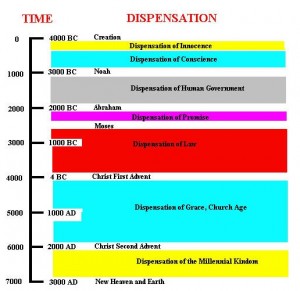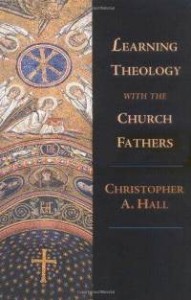I affirm Ryrie’s second point the basic dispensational philosophy of history as well. A philosophy of history is a systematic understanding in which past events and major sequences are unified and explained in light of a future ultimate meaning.[i] While all Christians believe the ultimate meaning is found in Christ, they disagree in the form and function. Paul wrote to the church in Ephesus, “To me, though I am the very least of all the saints, this grace was given, to preach to the Gentiles the unsearchable riches of Christ, and to bring to light for everyone what is the plan of the mystery hidden for ages in God who created all things,” (Eph 3:8–9, underline added). “The plan” is a rendering of the Greek οἰκονομία meaning “a plan which involves a set of arrangements (referring in the NT to God’s plan for bringing salvation to mankind within the course of history)—‘purpose, scheme, plan, arrangement.’”[ii]
In the second century, Irenaeus wrote, “He who, by Moses, instituted the legal dispensation, by which giving of the law we know that He spake to the fathers.”[iii] He then divides biblical history based on “four principal (καθολικαί) covenants given to the human race.”[iv] In the third century, church father Tertullian used the Latin word dispensatio to translate οἰκονομία and from that the English word dispensation derives. Hence, used in this way, a dispensation refers to a distinctive way in which God administers His relationship with mankind. As one can see, this line of thinking was present in primitive Christianity. In this way, nineteenth century dispensationalists were actually recovering theology that had been lost under centuries of Roman Catholic oppression.
As a system, dispensationalism has the most coherent philosophy of history because it accounts for the whole range of predictive prophecy. For example, the Old Testament predicts an earthly kingdom of universal peace (Is 2:2-4, 11:6-9, 65:17-25; Mic 4:1-5). Accordingly, futurist premillennialism accounts for the biblical data affirming that Christ will return to earth and rule over it for 1,000 years (Rev 20:4). Even so, I am willing to allow that “χίλια ἔτη” could be an idiom for a long period of time rather than insisting on precisely one thousand years. I agree with earlier divisions including the Adamic and Noahic dispensations found in revised dispensationalism. I somewhat appreciate the simplicity of the simple four-part structure associated with progressive dispensationalism: 1) Patriarchal (creation to Sinai); 2) Mosaic (Moses to Jesus ascension); 3) Ecclesial (ascension to second coming), and 4) Zionic (the millennial kingdom and eternal new creation).[v] However, Ryrie argues that progressive dispensationalists make the goal atemporal by conflating eternity and the millennium.[vi] While progressives place the millennial reign prior to the eternal state within the Zionic dispensation, it seems to confuse the matter. Thus, I agree with the older school that posits the eternal state as a distinct unit. Hence, my position entails: 1) Adamic; 2) Noahic; 3) Patriarchal; 4) Mosaic; 5) Church; 6) Millennial; 7) Eternal. These offer more explanatory scope than the abridged scheme presented by progressives. Ultimately, the exact number and name of the dispensations is not as important as one’s hermeneutic.
On the third point, a literal interpretation of scripture, I think the work of progressive dispensationalists is helpful. Literal interpretation needs to be informed by literary understanding (e.g. genre). While the historical grammatical hermeneutic is best, biblical scholarship is certainly more informed today than the days of Darby and Scofield. The radical bifurcation of the church and Israel advocated in classic dispensationalism goes too far. Classic dispensationalists posited the Church and Israel as eternally separate. The Rose Guide to End Time Prophecy is helpful:
- Classic dispensationalists see the church as God’s heavenly people and Israel as God’s earthly people. These two groups will remain separate even in eternity. The church will be in heaven. Israel will be on the earth. (John Nelson Darby, Lewis Sperry Chafer, Cyrus I. Scofield)
- Revised dispensationalists still see the church and Israel as distinct. At the same time, they expect the saved from both groups to coexist in eternity in glorified and resurrected bodies. Ethnic Israel is the physical seed of Abraham; prior to the end of time, the nation of Israel will still receive the land that God promised. God temporarily set aside the unbelieving nation of Israel so that he could bring together believing Gentiles with a remnant of believing Jews in the church. The church is the spiritual seed of Abraham and includes believing Jews and Gentiles. (John Walvoord, Charles Caldwell Ryrie, J. Dwight Pentecost)
- Progressive dispensationalists are similar in many ways to new covenantalists. According to progressive dispensationalists, God has had one plan that he has unfolded from the beginning of time to the present. Each dispensation has simply emphasized a different aspect of this one plan. Jesus inaugurated a kingdom during his earthly ministry, and he will bring this kingdom to fruition in a future millennium. The nation of Israel will still receive the land that God promised to Abraham, and Jesus will govern Jews and Gentiles according to their separate nationalities during the millennium. The plan of God will, however, ultimately culminate with one people, joined together in the presence of God for all eternity.(Craig Blaising, Darrell Bock, Bruce Ware)[vii]
Even given classic’s extremes, they served as a needed corrective. Theology Professor at LBTS, Dan Mitchell cogently qualifies the final point, “It’s not so much the idea of a literal interpretation that marks the distinction, but it is the approach, do you approach the text inductively from Genesis forward or deductively from the fulfillment backward. If you have already decided that everything is fulfilled in Christ, then there really isn’t much to talk about in terms of future eschatology.”[viii] For these reasons, I believe the dispensationalism is superior to covenant theology and I find myself somewhere in the tension between the progressive and revised schools of thought.
This essay offered an analysis of dispensationalism. It sought to illustrate the value of the system by examining three defining points: the distinction between the church and Israel, the philosophy of history and a literal hermeneutic. The relationship between these points was shown. In the end, it seems that these points support the idea that dispensationalism is the key to biblical prophecy.
[i] Renald E. Showers, There Really Is a Difference! : A Comparison of Covenant and Dispensational Theology (Bellmawr, NJ: The Friends of Israel Gospel Ministry, 1990). 22.
[v] Craig A. Blaising and Darrell L. Bock, Progressive Dispensationalism (Grand Rapids, MI: Baker Books, 1993), 123.






